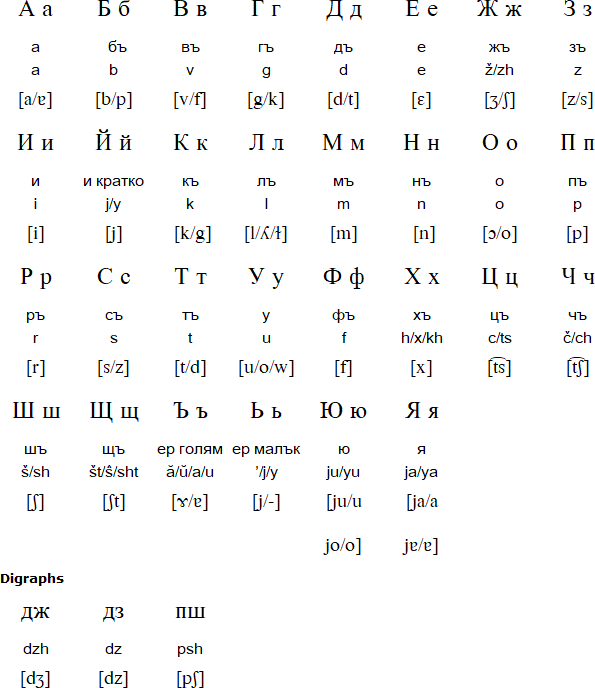![bulgarian[1]](https://shouball.com/wp-content/uploads/2017/11/bulgarian1-1.gif)
Bulgarian (Български)
Bulgarian is a Southern Slavic language with about 12 million speakers mainly in Bulgaria, but also in Ukraine, Macedonia, Serbia, Turkey, Greece, Romania, Canada, USA, Australia, Germany and Spain. Bulgarian is mutually intelligible with Macedonian, and fairly closely related to Serbian, Croatian, Bosnian and Slovenian.
Bulgarian was the first Slavic language to be written: it start to appear in writing during the 9th century in the Glagolitic alphabet, which was gradually replaced by an early version of the Cyrillic alphabet over the following centuries.
At the end of the 18th century the Russian version of Cyrillic or the “civil script” of Peter the Great (1672-1725) was adapted to write Bulgarian as a result of the influence of printed books from Russia. During the 19th century a number of versions of this alphabet containing between 28 and 44 letters were used. In the 1870s a version of the alphabet with 32 letters proposed by Marin Drinov became widely used. This version remained in use until the orthographic reform of 1945 when the letters yat (Ѣ ѣ), and yus (Ѫ ѫ) were removed from the alphabet.
A modern literary language based on vernacular spoken Bulgarian was standardised after Bulgaria became independent in 1878. Many Turkish words were adopted into Bulgarian during the long period of Ottoman rule. Words have also been borrowed from Latin, Greek, Russian, French, Italian, German and increasingly from English.
Bulgarian alphabet (българска азбука)

Listen to a recording of the Bulgarian alphabet by Стефан Валериев Станчев
Notes
- Ю = [u] after a palatalized consonant
- Я = [a] after a palatalized consonant
- й is used before the vowels o and e, and can also be used after any vowel.
- The digraphs дж [ʤ], дз [ʣ̻] and пш [pʃ] are not considered separate letters.
- The letters Ѣ ѣ (yat/dvoyno e), Ѫ (yus) were removed from the Bulgarian alphabet when it was reformed in 1945.
Sample text
Всички хора се раждат свободни и равни по достойнство и права. Tе са надарени с разум и съвест и следва да се отнасят помежду си в дух на братство.
Transliteration
Vsichki hora se razhdat svobodni i ravni po dostoynstvo i prava. Te sa nadareni s razum i savest i sledva da se otnasyat pomezhdu si v duh na bratstvo.
Listen to a recording of this text by Стефан Валериев Станчев
Translation
All human beings are born free and equal in dignity and rights. They are endowed with reason and conscience and should act towards one another in a spirit of brotherhood.
(Article 1 of the Universal Declaration of Human Rights)
Recordings on this page by Стефан Валериев Станчев (Stefan Valeriev Stančev)
